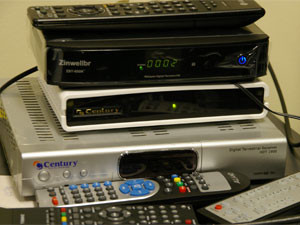
While Cabinet has approved the broadcasting digital migration amendment policy, mandating controls for set-top boxes (STBs), details of the exact system are not yet clear.
Ayanda Hollow, spokesman for minister of communications Faith Muthambi, has clarified the control system in subsidised STBs will be a security feature only, and will not include conditional access or encryption. Yet, the industry will still have to wait for the policy to be gazetted for full details, which he says will happen "as soon as possible".
However, Loren Braithwaite-Kabosha, CEO of the South African Communications Forum (SACF), says there is no definition of what controls - an overarching term - means, and this will not be clarified until the gazette is published. She notes the forum is hopeful some form of encryption will be included in the gazette to protect premium broadcasts.
Braithwaite-Kabosha says clarity is needed as to whether broadcasters will be able to send encrypted programmes to end-users, and whether retail decoders will be able to accept encrypted signal.
"Broadcasting on a digital platform creates greater opportunity for piracy, as a digital broadcast virtually provides consumers with a master of the original programme. Without encryption, movies and other programming could be immediately copied and distributed illegally. Premium content providers, including series and movie distributors, will not sell their content to a digital broadcaster which does not have a system to protect content."
Braithwaite-Kabosha said the SACF would also like to know whether the control system will provide other benefits for consumers such as enabling over-the-air software updates. "Without conditional access, it is possible consumers would have to replace their set-top boxes frequently, to ensure it remained up to date."
She uses Kenya's experience as an example. Kenya has started analogue switch-off and has scrapped the requirement of conditional access.
"The Kenyan market was then flooded with cheap, poorly-made set-top box imports that had a high rate of failure. The last thing we can afford now is a repeat of the Kenyan debacle. Based, in part, on this experience, Tanzania, Malawi and Namibia all required a control system with conditional access in all set-top boxes being used for their migration."
Subsidised boxes
Meanwhile, the Universal Service and Access Agency of SA has yet to award migration tenders, worth a total of R4.3 billion, for the manufacture of subsidised boxes. This tender was meant to be granted at the end of last month, or the start of this one. The agency was not available for comment this morning.
The Cabinet statement also said government will provide free STBs to more than five million poor television household owners with priority given to those households in the "border region areas" of the country.
Marian Shinn, Democratic Alliance shadow minister of telecoms and postal services, said in a statement this contradicts the plan for STBs to be delivered to identified poor households, subsidising them on a sliding scale, depending on the total household income.
"I await to see the full details of the revised policy to understand whether the five million STBs will indeed be free. If this change has been made then the available finance, of which there is already a shortfall of R1.9 billion, will be totally inadequate to the task."
Share